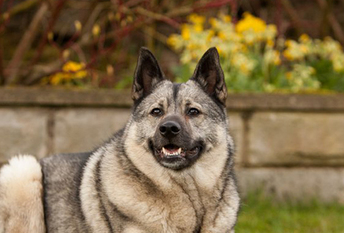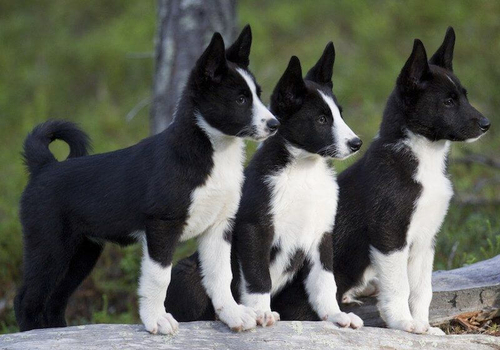Beyond regular weekly grooming, the occasional bath will keep your Karelian Bear Dogclean and looking his best. Grooming can be a wonderful bonding experience for you and your pet.
The strong, fast-growing nails should be trimmed regularly with a nail clipper or grinder to avoid overgrowth, splitting, and cracking. Their ears should be checked regularly to avoid a buildup of wax and debris, which can result in infection. Teeth should be brushed regularly.
Because the Karelian Bear Dog was developed for hunting it is a fairly high-energy breed that requires a good bit of daily exercise.
Options for exercise include playtime in the backyard, preferably fenced, or walks several times a day. Exercise can also come in the form of indoor activities, like hide-and-seek, chasing a ball rolled along the floor, or learning new tricks.
Certain outdoor activities like swimming, hiking, and retrieving balls or flying discs can provide a good outlet for expending energy. If you live in an apartment, even short walks in the hallways can give your dog some exercise, especially during inclement weather.
Training for dog sports like agility, obedience, and rally can also be a great way to give your dog exercise.
The Karelian Bear Dog should do well on high-quality dog food, whether commercially manufactured or home-prepared with your veterinarian’s supervision and approval. Any diet should be appropriate to the dog’s age (puppy, adult, or senior). Some dogs are prone to gettingoverweight, so watch your dog’s calorie consumption and weight level.
Treatscan be an important aid in training, but giving too many can cause obesity. Learn about whichhuman foodsare safe for dogs, and which are not. Check with your vet if you have any concerns about your dog’s weight or diet.Clean, fresh water should be available at all times.
The Karelian Bear Dog is a fairly healthy dog, though its average lifespan of 10 to 12 years is a little shorter than the average for other medium-sized breeds.
This dog breed is prone to certain health problems likehip dysplasia, dental problems, and eye problems. Sound breeding is important for these dogs in terms of both health and temperament.
The Karelian Bear Dog is an intelligent breed, though its background in hunting aggressive game gives it a bit of an independent or stubborn streak.
These dogs have been known to develop aggression toward other dogs so they need a great deal of socialization and training from a young age.
In terms of training methods, positive reinforcement is always a good idea but you will need to maintain strong leadership and be firm and consistent during training with this breed. Aggressive behaviors should not be tolerated.













